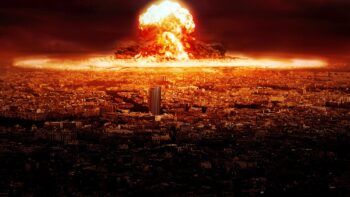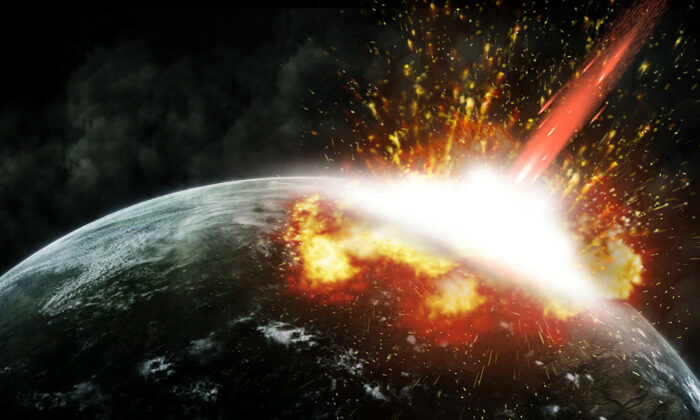The Symbolic Nature of Sci-fi Apocalyptic Disaster Films
Who doesn’t love a good disaster film? How often have we sat on the edge of our seat in a theater and watch as carnage and destruction decimate our planet? The more deadly and vicious the threat, the more we want it. Film has a unique way of putting us in the thick of things as we are surrounded by crashing tsunamis, exploding volcanoes, off-course asteroids, virulent viruses, alien invasions, or any number of phenomena destined to destroy our way of life.
Disaster films generally utilize an ensemble cast with each character bringing a bit of their story to the overarching one. This aspect is important to the success or failure of a film. Recently Warner Bros. released the monster disaster movie Godzilla vs. Kong. Critics faulted the movie for failing to develop its human characters. (Perhaps I am too simple. I didn’t care about the human element. I just wanted to see the lizard fight the monkey.) Whether one agrees with the sentiment, a successful disaster film appeals to our concerns about the humans involved.
Many films in the disaster genre explore unique symbolism. Given all the disaster film subgenres—manmade, apocalyptic, natural disaster, epidemics, and pandemics, and more—I’ll limit this article to the analysis of a selection of apocalyptic disaster films.
Apocalyptic films explore humanity’s purpose and desire for existence
Armageddon (1998) explored humanity’s potential end via an asteroid.
According to my mom, the plot is similar to 1978’s Meteor, with the added intrigue of Cold War politics with the United States’ favorite enemy, Russia. Humanity’s salvation rests on the eclectic motley crew of an oil rig who are tasked with drilling into the asteroid to break it apart. Scientific inaccuracies abound (according to those who care about such things), but the movie appealed to audiences because of the relatable characters.
In the movie, the world’s hopes rest on this crew. Within the movie, people of all different religious beliefs come together to pray for this crew’s success. Ultimately, they succeed when Bruce Willis’s character sacrifices himself at the end to save the world, a definitive parallel to Christ’s sacrifice. Praying to God represented people’s understanding that if this plan will succeed, the people need divine intervention. I don’t recall anyone heckling the thought of God intervening. In fact, this was welcomed.
Armageddon had more comedy than probably is warranted. However, laughter goes a long way in making dark news light. Deep Impact (1998), Armageddon’s fraternal twin, also explored the potential destruction of Earth via an asteroid. This film was more of an emotional story with potential survivors being chosen by a lottery. Deep Impact dealt with water, an allusion to Noah’s flood whose waters God used to cleanse the Earth. At the end, Morgan Freeman’s character stares at the camera saying, “The waters receded,” indicating God had spared his full judgement on Earth.
While I wouldn’t call both movies Christian, they had themes and precepts that fall in a Christian worldview. Our existence is completely dependent on God. Irrevocably. Anyone who believes different is welcome to…but it doesn’t make it true. Any illusion of control is simply that…an illusion.
Apocalyptic movies highlight our desire to prevent self-destruction
Recently my Granny and I watched a movie called Crack in the World (1965). In this movie, scientists send a nuclear missile into the Earth’s crust to access geothermal energy and release a crack that travels around the world. After the experiment succeeds, one scene shows all the animals running away. It made me laugh. (“Stupid humans,” you could hear the animals say.) This movie obviously showed how man’s consistent need to manipulate nature points to his own self-destruction.
Earth’s crust to access geothermal energy and release a crack that travels around the world. After the experiment succeeds, one scene shows all the animals running away. It made me laugh. (“Stupid humans,” you could hear the animals say.) This movie obviously showed how man’s consistent need to manipulate nature points to his own self-destruction.
Just like other impossible science fiction from the 1960s, the crack around the world is stopped by some secret underground laboratory and a big red button. The crack releases a giant chunk of the Earth, which glows and turns into a second moon.
The Core (2003) also digs into the Earth to depict our own self-destruction. In this film, our planet’s core, believed to be a Mars-sized chunk of iron in rapid motion, has stopped spinning. This affects the Earth’s electromagnetic field which affects life. Dangerous microwaves pierce through the atmosphere in lethal doses. Bizarre weather destroys cities. Devices affected by the electromagnetic field’s volatile change cause loss of life.
Our motley crew of terra-nauts have constructed a ship made from an improbable element called Unobtainium. They inform us that America’s enemies created a device that could create directed seismic disasters. Because one good turn deserves another, the main scientist of the project says, “They [our enemies] built it first. I built it better. M. A. D.! Mutually Assured Destruction.”
In The Core, one member of the crew dies. An argument ensues and the commander explains the cause of death as, “Fate or God—” But the science teacher screams. “You leave God out of this.” In the movie, the commander chooses not to save his friend and instead reluctantly chooses to save the world. This dialogue mirrors that it wasn’t fate or God, but man who caused the demise.
At the end, with help from nuclear bombs, they restart the Earth’s core.
These films are like Aesop’s fables about man’s arrogance. In both movies, scientists are responsible for the planet’s approaching destruction. In the name of defense, they create weapons to capitalize on power.
Apocalyptic films reveal that humanity cannot stop its own judgment
Can you remember the fervor over “Mayan prophecy” that predicted the world’s end on December 21, 2012? I’m so glad I didn’t set my watch. That fervor exploded into several movies, such as 2012 (2009). The apocalyptic end, caused by the shifting of the Earth’s crust, was spectacular.
I’ve watched the movie many times. Each time, I’m struck by its symbolism.
Water once again points to God’s judgment. 2012 shows most of the United States being destroyed by earthquakes and tsunamis. However, the story’s disasters shifts in subtlety, from a nominal spiritual element that all experience to a subjective emphasis.
Consider this: In the scene where the president speaks gently to the terrified masses, he begins to recite Psalms 23—but he is cut off. Fear ensues and volcanoes erupt. Here in a nation purporting to be Christian, the words of the Lord are superficially comforting.
A giant tsunami wave hurtles toward the cool, collected façade of the Dalai Lama who faces his end with serenity. In his last effort, he rings the bell of the temple before the wave crashes upon him.
The crazy prepper disc jockey who embraced the truth of the end joyfully accepts his fate, laughing and smiling in the face of death as a fiery rock burns him to a crisp.
Lastly, the Indian scientist, who discovered the changes within the Earth, dies in the disaster he predicted along with his family.1
This film and many others depict the inevitability of humanity’s end. We understand our flawed, wicked nature. We don’t have to look very far to see humanity’s tendencies toward destruction. We must be stopped—and if we’re stopped by worldwide destruction, so be it.
Biblical prophecy points not only to a certain end, but a new beginning
If you want to start an eschatological fist fight, talk about the apocalypse according to Scripture. Christians share two popular points of views on the popular prophetic passages of Daniel, Ezekiel, the four Gospels, and Revelation.
The futurist view
This centers the apocalypse on the person of the Antichrist who develops a one-world government, with the Mark of the Beast as a way of separating true believers from the damned. It involves a complex aligning of geopolitical events to bring about the end in which the Rapture will occur, the reign of the Antichrist, then a global war between Satan and his demonic forces and God—who will ultimately win. The judgment ends by the purification of fire. 2
separating true believers from the damned. It involves a complex aligning of geopolitical events to bring about the end in which the Rapture will occur, the reign of the Antichrist, then a global war between Satan and his demonic forces and God—who will ultimately win. The judgment ends by the purification of fire. 2
The Left Behind series by Tim LaHaye and Jerry B. Jenkins explores this view.
The preterist view
In this concept, the apocalypse is the breaking of the old covenant with Israel and the forging of the new one. The language of Revelation is metaphorical with allusions that first-century Jews would have understood: for example, the Antichrist being Nero, the destruction of the temple in 70 A.D., and other geopolitical events of the known world during that time frame. Most proponents of the preterist view believe that not all events mentioned in Revelation have already happened but that some are still yet future.
The Last Disciple series by Hank Hanegraaf explores this scenario.
Either way, God writes the ending
Regardless of one’s view, apocalyptic films mirror this biblical end-times imagery. However, most apocalyptic films stop at humanity’s end, where only a remnant of people are saved. Or, worse, everyone gets wiped out. Humanity dies away into stardust.
Thanks be to God, that’s not the end.
God’s judgment unleashes His righteous wrath that He has held back for so long. Yet, instead of utter destruction, He will restore creation to perfection: a New Heavens and New Earth where sin will have no reign.
That’s different even from supposedly hopeful endings like in the movie Knowing (2009), where we find Nicolas Cage running around trying to figure out end-times stuff. At the last end, mysterious beings (angels?) collect his children and a few others and take them to another planet (another Earth?) where they run by a tree, implied to be the tree of life. The problem with that scenario is that all the kids get saved—but they’re still stuck in their sins. Eventually, their descendants will make the same mistakes as their forefathers. In that movie, man’s destructive cycle continues.
Our Lord will end that cycle and bring a new beginning that will last forever.
What are some of your favorite apocalyptic sci-fi movies or series? What are some other underlying themes I missed? Share your thoughts!







































I get sad when I consider that my faith tells me that such an ending is coming in the next decade or two, and no one seems to care. It’s a real call to get yourself straight with the Lord, before it’s too late. As entertainment, I could cry, or I could puke out of disgust. But be entertained? Not this ol’far*.
Thank you as always David for your insights. Most people feel a sense of things coming to a head.
Parker, I think you and I are soul sisters. hahaha! Seriously. Hubby and I love natural disaster movies! Yeah, Armageddon tops the list. We also love Space Cowboys (Clint Eastwood!!), The Day After Tomorrow, I, Robot (which is more human disaster than natural) … then there’s the potential disaster Tremors (because Kevin Bacon), the based-on-real-events Apollo 13, and somehow, Minority Report feels a little human disaster related.
I think people love end-of-all-things movies because we like that we beat it. Someone, like a normal person and not a genius, figures out how to save the Earth. We love that! And I find it funny that Hollywood tries so hard to put God into those kinds of movies. I don’t think they do it to appeal to Christians. I think they just can’t help themselves. God is omnipresent, right? hahaha!
I forgot about those movies! I admit, I’ve not seen Space Cowboys but now I want to! Tremors! Yes, nostalgia trip. I love how you said Hollywood can’t help itself!
Lol! I love that “Don’t mean to brag or anything…” Pinterest photo on the right up here Parker. Love it! Yep. Every single time, but we speculative fiction folk just eat it up. We love seeing our planet and cities go through a destructive cycle, only for some hero or group of “saviors” to save the day. Can’t wait until the next cool disaster flick to get us going. “Geostorm” and “The Day After Tomorrow” anyone?
There is something to it, isn’t it? I like the Day After Tomorrow. Another one I liked was a made for TV movie with the doctor from SGA. It was for Syfy TV. Can’t remember the name though. It was a Mayan Prophecy one using the Easter Isle heads as part of the plot.
Nice article Parker. I find apocalyptic stories interesting myself, but the only good ending is the one God already wrote.
I think the reason everyone is drawn to these types of stories is because it points them toward the truth that something better awaits us after this world is done away with. Sadly, many do not see the full truth behind that message but only resonate with the fact that this world will pass away.
Thank the Lord there is something better than this! I can’t wait to see it.